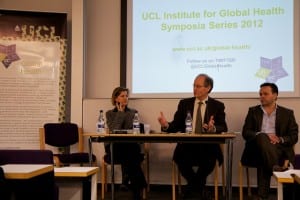A widening European health divide…it’s enough to drive you to drink
By news editor, on 28 February 2012
 Far from ‘closing the gap’ in life expectancy, health inequalities in Europe have deepened further. Drawing upon his forthcoming review of health inequalities in Europe, Michael Marmotargued that social inequalities, with their impact on life expectancy, should be at the top of the public agenda and we should place fairness at the heart of decision-making for health.
Far from ‘closing the gap’ in life expectancy, health inequalities in Europe have deepened further. Drawing upon his forthcoming review of health inequalities in Europe, Michael Marmotargued that social inequalities, with their impact on life expectancy, should be at the top of the public agenda and we should place fairness at the heart of decision-making for health.
Integral to Marmot’s work is the graded relationship between social deprivation and a multitude of health outcomes. He reports that male life expectancy in the Russian Federation is 20 years less than in Iceland, but also highlights “huge differences within countries” and that “the gradient is increasing”.
Alcohol use: a cause or consequence of inequality?
What is driving the social gradient in health? Panel member Christopher Gerry stressed that “Alcohol matters”, and quoting Richard Peto said: “More than half of all deaths of people of working age in Russia are caused by alcohol.” But importantly, Gerry identified alcohol as just the proximate cause: “What makes people drink in the way that they do is the real question.”
Marmot was quick to distinguish between immediate causes and the underlying psychosocial mechanisms that drive unhealthy behaviours. In the case of Russia: “Some people are utterly convinced that alcohol plays a role, the main role” in health inequalities. But he disagreed, while acknowledging its role in violent deaths.
“People are feeling disempowered”
To support his argument, Marmot cited the ironically named HAPIEE Study (Health, Alcohol and Psychosocial factors In Eastern Europe) which identifies lack of control and an “effort-reward imbalance” as drivers of social inequality.
This research indicates that Russians feel little life control and have higher mortality rates as a result. Similarly, the ‘effort-reward imbalance’, the ever diminishing returns for the disenfranchised, links to depression. The greater the imbalance, the greater the depression: “People go out and kill themselves with alcohol. It’s part of the mechanism.”
“It’s not about East-West anymore”
Shifting the focus, Anthony Costello pointed out that: “We’re talking about the East-West divide as if everything’s ok in the West, but we’re in the biggest crisis in western Europe in 70 years.”
He predicted that we will now see the same problems as in Russia in parts of western Europe: a progressively decreasing age peak for liver cirrhosis mortality in the UK and observations of changing patterns of drinking over time suggest he may be right.
Jolene Skordis-Worral believes this blurring of the East-West divide is compounded by the current UK policy environment and pointed out that the nature of the austerity measures in the UK stands in the way of fairness and health equity. “The implementation of austerity measures is not fair…We have to start accepting that it’s not right.”
Marmot was disparaging of the “synthetic fuss” raised recently about one banker’s bonus but thinks it reflects a growing awareness: “The public are not fooled, they know things are unfair”. But Skordis-Worral seemed despondent: she had hoped public expectation would change as a result of the banking crisis, but feels that in times of austerity we have just “turned back to capitalism”.
What can be done to bridge the health divide?
According to Marmot, we should invest in early child development, adopt a life course approach to build resilience within populations, promote social justice and take “a more explicit human rights approach to health”. He also advocated empowering individuals: “People need control over their lives”.
This combination of individual empowerment with fair and enabling health systems, the panel agreed, is the key to reducing health inequalities, with Skordis-Worral adding that even when people are empowered to take control of their health, if the quality of health services is inadequate a “capability gap” obstructs attempts to reduce inequalities.
Marmot concluded that “if you put fairness at the heart of all decision-making, health would improve and health inequalities would diminish.”
This blog was written by Jenny Saxton, PhD student (UCL Centre for International Health and Development) and reports on a symposium that took place on the 22nd February 2012.
The Speakers included: Professor Sir Michael Marmot, Director (UCL International Institute of Society & Health, and MRC Research Professor in Epidemiology), Professor Anthony Costello (Director, UCL Institute for Global Health), Dr Christopher J Gerry (Senior Lecturer in Political Economy UCL School of Slavonic and East European Studies) and Dr Jolene Skordis-Worrall (Lecturer in Health Economics, UCL Institute for Global Health).
Michael Marmot’s Review on the Social Determinants of Health and the Health Divide will be published later this year.
Photographs by Haoyang Zhao, UCLU Photosoc.
 Close
Close

